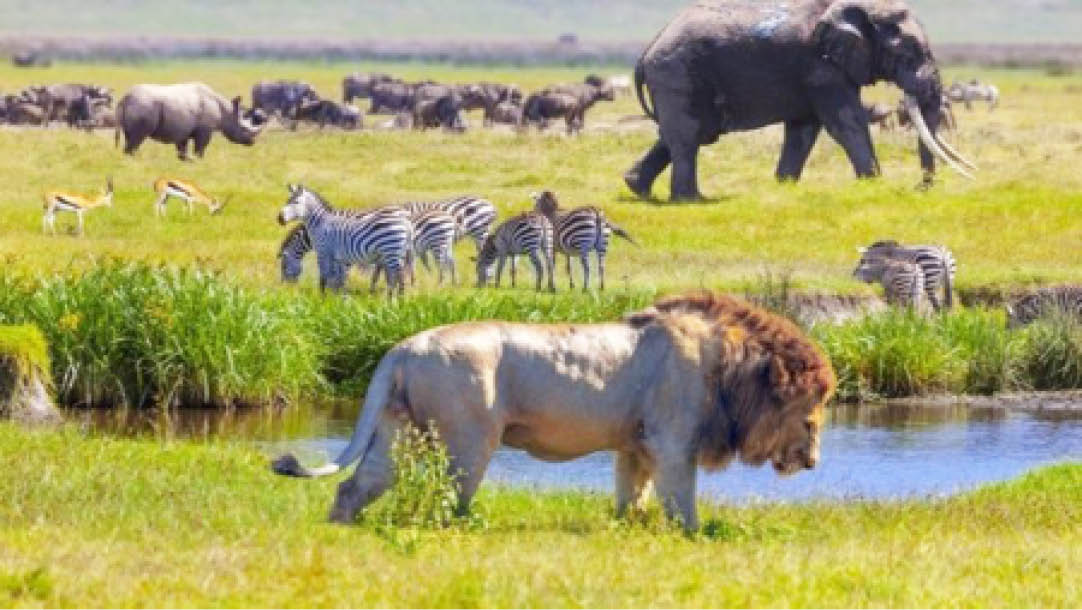World Wildlife Day: Sustaining wildlife is sustaining human life
Earth is home to countless species of animals and plants. This rich diversity and the billions of years during which its numerous elements have interacted, according to experts, are precisely what have made the planet habitable for all living creatures, including humans. Humans have depended on the constant interplay and interlinkages between all elements of […]

World Wildlife Day
Earth is home to countless species of animals and plants. This rich diversity and the billions of years during which its numerous elements have interacted, according to experts, are precisely what have made the planet habitable for all living creatures, including humans.
Humans have depended on the constant interplay and interlinkages between all elements of the biosphere for all their needs, such as the air they breathe, the food, energy and the materials they need for all purposes.
However, unsustainable human activities and overexploitation of the species and natural resources that make up the habitats and ecosystems of all wildlife are endangering the world’s biodiversity.
According to the United Nations General Assembly, nearly a quarter of all species are presently at risk of going extinct in the coming decades, and their demise would only speed up the disappearance of countless others, putting humans in danger as well.
The General Assembly, meanwhile, reaffirmed the intrinsic value of wildlife and its various contributions, including ecological, genetic, social, economic, scientific, educational, cultural, recreational and aesthetic, to sustainable development and human well-being.
It said: “We will work to raise awareness of the multitude of benefits of wildlife to people, particularly to those communities that live in proximity to it, and we will discuss the threats they are facing and the urgent need for governments and others to add their voices and take actions.”
As Nigeria joined the rest of the world to mark the World Wildlife Day on 3rd March, with theme ‘Sustaining All Life on Earth’ to raise awareness of the world’s wild fauna and flora, it also recognised the important role of the Convention on International Trade in Endangered Species of Wild Fauna and Flora (CITES) in ensuring that international trade does not threaten the survival of species.
The Conservator General of the National Park Service, Dr. Ibrahim Musa Goni, while giving a brief of the park at the end of last year, said the service is a paramilitary agency established to provide security, manage, regulate the use of the diverse and unique natural resources within the parks in the country.
He revealed that the Nigeria National Park Service currently manages seven national parks in the country, saying, “Of the 6.7 per cent forest cover of the country, these parks account for a total of 22,206km2 conservation area which is about 3 per cent of the total land mass of the country (923.74km2).”
He said the parks are reputed to be a safe haven to some highly endangered species of wildlife. These include chimpanzees, cheetahs, leopards, buffalos, elephants, lions, golden cats, roan antelopes, hunting dogs and giant forest hogs.
Others are red river hogs, mountain reedbucks, sitatungas, colobus monkeys, giant elands, hartebeests, baboons, hippopotami, crocodiles, secretary birds, hammerkops, royal fish eagles, etc most of them in the Gashaka Gumpti park in Taraba.
The flora species include African rosewood, Pterocarpus erinaceus, ebony, mahogany, iroko, ironwood etc.
The Chad Basin National Park in Borno/Yobe states, according to him, also contains some rare desert wildlife species.
“The Dagona water fowls sanctuary is an internationally recognised wintering site for palaearctic migrant birds coming from Europe, Asia and other parts of the world. Some of the species frequently sighted include garganey, pintail, pelican, spur-winged geese, European stocks and glossy ibis,” he said.
Dr. Goni said despite the abundance of this natural and cultural attributes within the national parks and the roles they play, Nigerians are yet to appreciate the importance of these protected areas and their contributions to the mitigation of climate change, security, wellbeing of the citizenry and to the nation’s economy.
While most of these animals and plants have drastically reduced, others have gone into extinction due to illegal human exploitation and trade.
The conservator general said illegal activities within the parks, such as poaching, logging, encroachment and grazing, have remained a major challenge faced by the service.
Other challenges, he said, included armed banditry and insurgency in and around the parks, poor quality of tourism infrastructure, lack of zeal of Nigerians for leisure and tourism, poor road network to the parks and inadequate number of modern operational equipment.
Also at an event to mark the World Wildlife Day in Abuja, the Conservator General urged Nigerians to stop bush meat consumption, saying, Nigerians should rely more on alternative sources of animal protection such as animal husbandry, fishery and rabbitry.
He said that would help improve on the wildlife population and possibly eliminate the threat of extinction currently confronting the endangered wildlife species.
“The National Park Service has been engaging with various stakeholders to continue creating awareness on the dangers of illegal bush meat hunting and uncontrolled logging of natural vegetation,” he said.
He said government at all levels should also consider environmentally friendly policies capable of reducing environmental degradation.
In her keynote address, Minister of State, Environment, Sharon Ikeazor said Nigeria is endowed with enormous biodiversity resources of both plant and animal species.
“There are about 7,895 plant species and over 22,000 vertebrate and invertebrate species which include; insects, fishes, birds and mammals, thus showing the depth of natural resources found within the geographical boundary of the country,” she said.
The minister, represented by the Permanent Secretary, Dr. Bakari Wadinga, said the effective management of these enormous resources in actualising the United Nations SDGs calls for the celebration of the World Wildlife Day.
She said the Day was not meant to wine and dine but to check and balance the successes witnessed in the fight against wildlife crimes and also improve awareness on the threat of the unsustainable harvest of wildlife resources.
